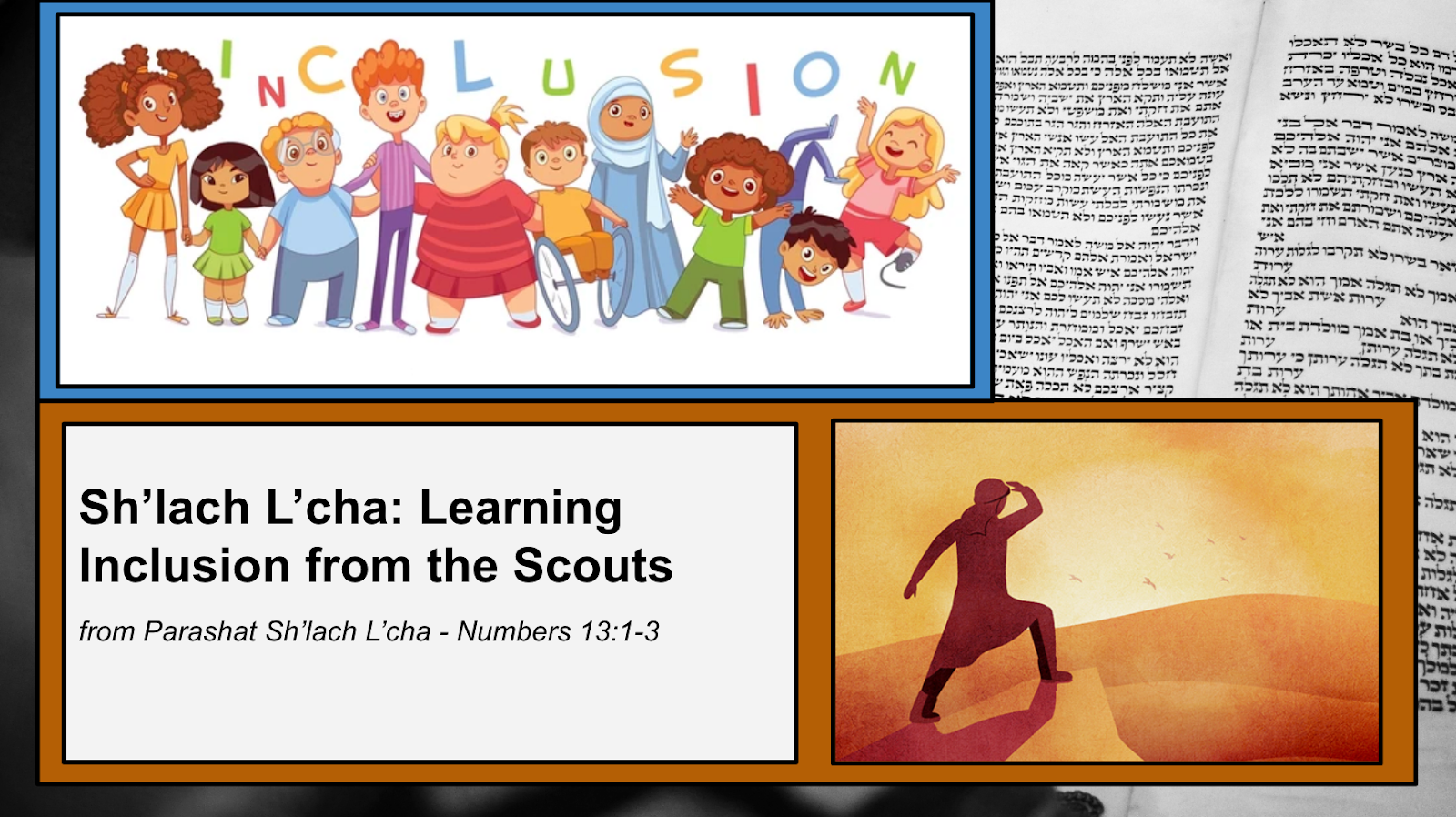Guest Post: “Sh’lach L’cha: Learning Inclusion from the Scouts”
This guest post is adapted by cantorial soloist and CBI member Ziva Larson, who led Shabbat services on Saturday, June 29, 2024, from a d’var by Hazzan Sara Geffen Geller; Ziva’s text is in green.
“Parashat Sh’lach L’cha begins with God directing Moses to assemble a team [for a scouting trip into the land of Canaan]. God says:
שְׁלַח־לְךָ֣ אֲנָשִׁ֗ים וְיָתֻ֙רוּ֙ אֶת־אֶ֣רֶץ כְּנַ֔עַן אֲשֶׁר־אֲנִ֥י נֹתֵ֖ן לִבְנֵ֣י יִשְׂרָאֵ֑ל אִ֣ישׁ אֶחָד֩ אִ֨ישׁ אֶחָ֜ד לְמַטֵּ֤ה אֲבֹתָיו֙ תִּשְׁלָ֔חוּ כֹּ֖ל נָשִׂ֥יא בָהֶֽם׃
Sh’lach l’cha anashim v’yaturu et eretz K’na-an asher ani notein liv’nei Yisrael ish echad, ish echad, l’mateih avotav tishlachu kol nasi vahem.
‘Send agents to scout the land of Canaan, which I am giving to the Israelite people; send one participant from each of their ancestral tribes, each one a chieftain among them.’ (Numbers 13:2)
The language is doubled:
Ish Echad Ish Echad.
One person, one person.
Why the repetition?
And, the final phrase – kol nasi vahem – each prince from them. Why the seeming redundance?
Rabbi Ralph Pelcovits shared the insights of the Alshich, a 16th century scholar born in the Ottoman Empire, who lived in Tzfat:
‘From the start, Moses worried that 12 scouts would bring back false, negative reports about the land. He sought to mitigate this possibility by excluding representatives from the tribes which did not have reputations for telling the truth.’
Which representatives did not have a good reputation?
The Alshich says Moses remembered that Judah displayed the bloody garment to Jacob and allowed Jacob to come to the false conclusion that his favorite son, Joseph, was dead. Moses feared that the representative of the Tribe of Judah would also lead the people astray like their ancestor.
Moses also thought of Joseph, and his early reputation as a tattle-tale. So, Moses felt, why should he let TWO of Joseph’s descendants go on the mission?
As a way of resolving this, Moses wanted to allow a member of the tribe of Menashe on the trip, but NOT allow anyone from the tribe of Ephraim to participate. In this way, descendants of Joseph would not have more votes than the other tribes.
However, God said: NO!
You must send one person from each and EVERY tribe.
You must send the PRINCE of EACH tribe.
As a result, Moses sent Caleb, the son of Jephuneh from the tribe of Judah, and Joshua the son of Nun from the tribe of Ephraim. Contrary to Moses’ expectations, they turned out to be the MOST supportive, the MOST reliable, and the BEST allies of Moses.
This explanation reminds me of Psalm 118:22, commonly recited as part of Hallel:
אֶ֭בֶן מָאֲס֣וּ הַבּוֹנִ֑ים הָ֝יְתָ֗ה לְרֹ֣אשׁ פִּנָּֽה׃
Even ma-asu habonim hay’tah l’rosh pinah.
‘The stone that the builders rejected has become the chief cornerstone.’
We can think of examples when people are misjudged and excluded:”
- Exclusionary zoning policies and discrimination in housing and lending markets persists and continues to evolve, thus perpetuating racially-segregated neighborhoods throughout the U.S.
- Many neurodivergent kids are segregated from their peers in school and forced into the neurodivergent equivalent of “gay conversion therapy” due to their neurotypes and needs being misunderstood, misjudged, and unsupported.
- Yesterday, the Supreme Court ruled that cities can punish unhoused people for sleeping in public, even if they have nowhere else to go. Additionally, unhoused people are excluded from many places by anti-homeless hostile architecture posing as things like “wheelchair-accessible park benches” and anti-homeless policies such as those that allow only paying customers to use restrooms.
These are just a few examples of how people are misjudged and excluded in our society. I invite you to take a moment to think of a time when you were misjudged or excluded. How did that experience impact you? How did it make you feel?
The pain of being misjudged and excluded and the negative impact those experiences have on our own lives can help us understand why it is so important to refrain from rushing to judge others and to work to include people.
“As God commanded Moses to include Caleb and Joshua, we can imagine the same command applies to us. We can seek to include people.”
As the Psalmist observes, the person we first discounted has value that we failed to see. All people have value simply because they exist. A person does not need to do anything or be a certain way in order to have worth. And all of us inhabit the same world. Each and every one of us is important and valuable. And it is up to each of us to not only recognize the inherent worth of every person but also to work to include others, to dismantle systems of oppression, to fight for justice, and to build a world where everyone has their fundamental needs met and where everyone can live in safety and peace.
Kein y’hi ratzon. May it be so. Shabbat shalom.
References
- [Original D’var] Shlach Lecha: Learning Inclusion from the Scouts (by Hazzan Sara Geffen Geller)
- Numbers 13:1-3
- Psalms 118:22
- Causes and Consequences of Separate and Unequal Neighborhoods (by Margery Austin Turner and Solomon Greene)
- Segregating Disabled Children From Their Peers Doesn’t Help Them, Advocates Say (by Eleanor J. Bader, 2022)
- “Why the ‘Treatment’ of Autism is a Form of Conversion Therapy” (by Cassandra Kislenko, 2022)
- ACLU Responds to Supreme Court Decision that Cities Can Punish People for Being Homeless (June 28, 2024)
- Design Against Humanity: Examining Anti-homeless Architecture (by National Coalition for the Homeless, 2023)
- “Wheelchair-accessible Park Bench” = Anti-homeless Architecture (by Gary Meikle, 2024)
- No Place to Go: The Urgent Need for Public Bathrooms (by Invisible Loki, 2024)






